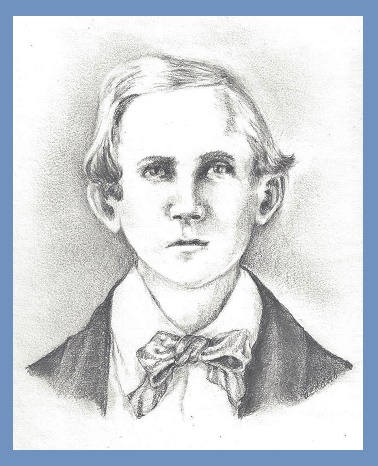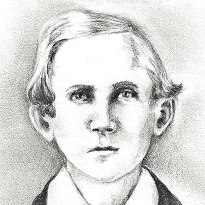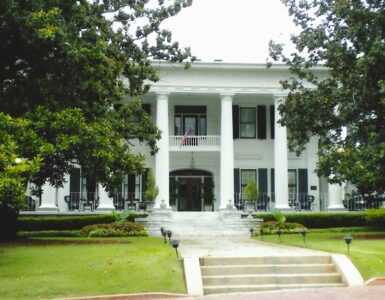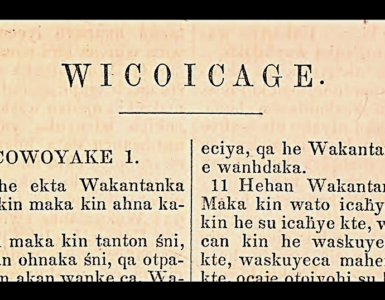 Scottish Highlanders settled in Robeson and Scotland Counties in North Carolina having journeyed up the Cape Fear River from the coast. They established homes and farms along the upper tributaries and along the meandering river. To the west of the Highlanders were Scots Irish and to their east were English, Huguenot, Welsh, and German settlers. Into the Highland core of this Carolina melting pot was born Archibald McQueen around 1796. His interests were diverse. He read law for a short time after his graduating from the University of North Carolina, but then his attention turned to practicing medicine, however, believing himself called to the ministry he prepared to that end. Candidacy was granted McQueen in 1826 and when Fayetteville Presbytery organized the Smyrna Church its first pastor was Archibald McQueen. The specifics of his theological education were not found in the sources. Within the first year of his call, the Laurel Hill Church was added to his charge. McQueen was described as a gifted communicator who could preach the Word eloquently in both Gaelic and English.
Scottish Highlanders settled in Robeson and Scotland Counties in North Carolina having journeyed up the Cape Fear River from the coast. They established homes and farms along the upper tributaries and along the meandering river. To the west of the Highlanders were Scots Irish and to their east were English, Huguenot, Welsh, and German settlers. Into the Highland core of this Carolina melting pot was born Archibald McQueen around 1796. His interests were diverse. He read law for a short time after his graduating from the University of North Carolina, but then his attention turned to practicing medicine, however, believing himself called to the ministry he prepared to that end. Candidacy was granted McQueen in 1826 and when Fayetteville Presbytery organized the Smyrna Church its first pastor was Archibald McQueen. The specifics of his theological education were not found in the sources. Within the first year of his call, the Laurel Hill Church was added to his charge. McQueen was described as a gifted communicator who could preach the Word eloquently in both Gaelic and English.
If not for McQueen’s marriages he would likely have remained an obscure but locally popular preacher living on his family estate until he died and was lost to history. But such was not to be the case. The minister from North Carolina became a prime topic of debate within the judicatories of the Old School Presbyterian Church due to disciplinary action for his having broken the law of Scripture as interpreted by the Westminster Confession of Faith. His case was covered extensively by the religious press, while the secular press, in some cases, used the McQueen case as an opportunity to make light of Presbyterians in particular and Christians in general.
What did Archibald McQueen do to merit so much attention? Rev. McQueen was married three times in succession. First, he married Margaret Stewart and they had three children including a son named James Stewart McQueen. After Margaret’s death he married Juliana McLeod. Juliana and Archibald named their two children Archibald Alexander and John Knox. After less than seven years of marriage, Juliana died from some type of pulmonary disease. The third marriage took place October 24, 1841 when he married Mary McLeod. Note that the surnames of Juliana and Mary are both McLeod, which is not coincidental but rather consanguineous in that they were sisters. Archibald McQueen had married his deceased wife’s sister. Such marriages were contrary to the Westminster Confession’s statement summarizing Scripture’s teaching against marriages involving the near-kin of one’s spouse.
The man may not marry any of his wife’s kindred nearer in blood than he may of his own, nor the woman of her husband’s kindred nearer in blood than of her own. (24:4)
Process against McQueen began in Fayetteville Presbytery in 1842 and continued for six years producing overtures, debates, articles, letters, books, and decisions which led Charles Hodge to conclude that the uproar over McQueen’s marriage might well split the denomination. Central to the disciplinary action regarding McQueen was the persistence of the clerk of Fayetteville Presbytery, Colin McIver. A comment by one contemporary described McIver as a tenacious proponent of his views. The final tenacious link at the end of a long McIver chain occurred in 1847 when he complained to the General Assembly against the decision of the Synod of North Carolina allowing McQueen to continue in the ministry following his disciplinary suspension for his marriage. McIver was ruled out of order. Through all the processes, Archibald McQueen had not attended any of the Synod or General Assembly level procedures regarding himself.
Neither Colin McIver nor Archibald McQueen lived very long after these events. McIver enjoyed a stable ministry shepherding the Galatia and Barbeque Churches until he died January 18, 1850. When Fayetteville Presbytery received report of his passing the moderator, who ironically happened to be Archibald McQueen, appointed a committee to compose a memorial. Rev. McIver was buried in Fayetteville cemetery in a grave marked with a plain and simple stone purchased by his friends. The general impression from sources is that Pastor McIver had a difficult time financially as he ministered in a presbytery with many small churches, which was quite a contrast to the apparent wealth and property of the McQueen family. The years after McQueen’s marriage case may have been difficult for him as a minister because he did not have a pastoral call to consistently use his gifts, but then the lack of a call may have been his choice. Mary and Archibald McQueen were living in Robeson County on their 467 acres of land known as Queensdale when he died in 1854. Just like his presbytery colleague, Archibald McQueen received a memorial.
McQueen’s marriage resulting in church discipline was not an unusual case. Presbyterian judicatory minutes show several occurrences of a man marrying his deceased wife’s sister, but there were not only marriages of a man to his sister-in-law. Other unions warranting church discipline can be found in church records, such as a man marrying his deceased brother’s wife (Henry VIII of England is the most famous example of this), his half-brother’s widow, his wife’s brother’s daughter, his wife’s half-brother’s daughter, his deceased wife’s sister’s daughter, his mother’s brother’s widow, and his sister’s daughter. In the immediate antebellum years and those after the war, near-kin marriage cases were not so common, but a few cases did occur. In the 1880s both the P.C.U.S. and P.C.U.S.A. removed the affinity sentence from Westminster Confession 24:4, which means that both the Presbyterian Church in America and the Orthodox Presbyterian Church do not have the statement in their editions. Associate Reformed Presbyterians removed the sentence in 2001.
BARRY WAUGH
This article is an adaptation, condensation, and modification of chapter 4 of my Ph.D. dissertation, The History of a Confessional Sentence, Westminster Theological Seminary, 2002. On pages 278-81 of the dissertation is a table of twenty-four cases of near-kin marriage prosecuted at all levels of the judicatories. The lovely sketch of McQueen was drawn by a kind lady several years ago.





